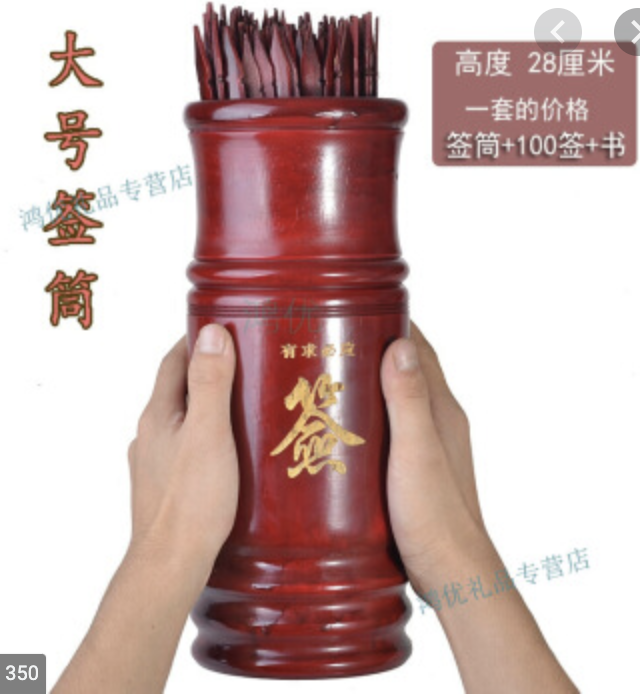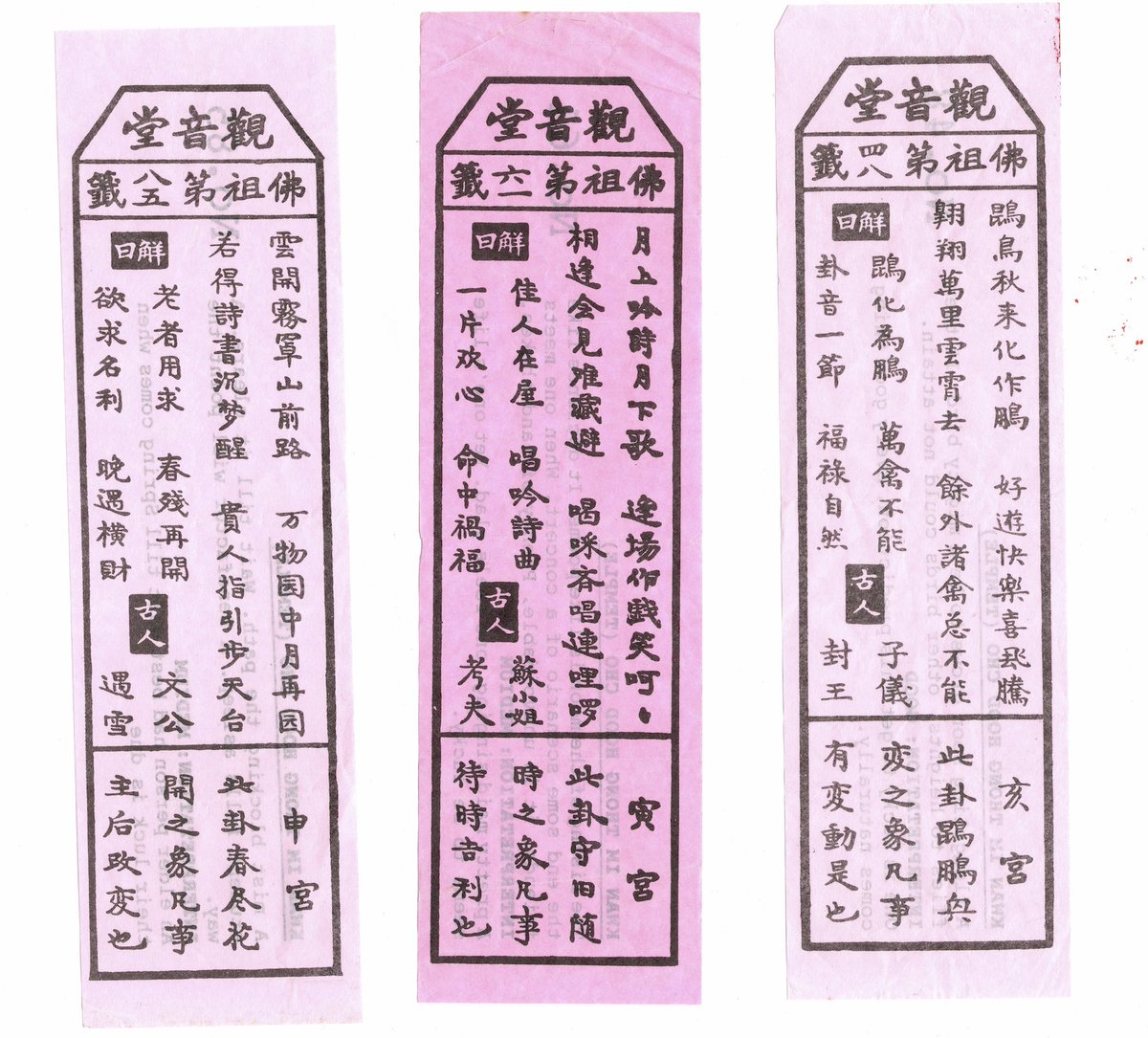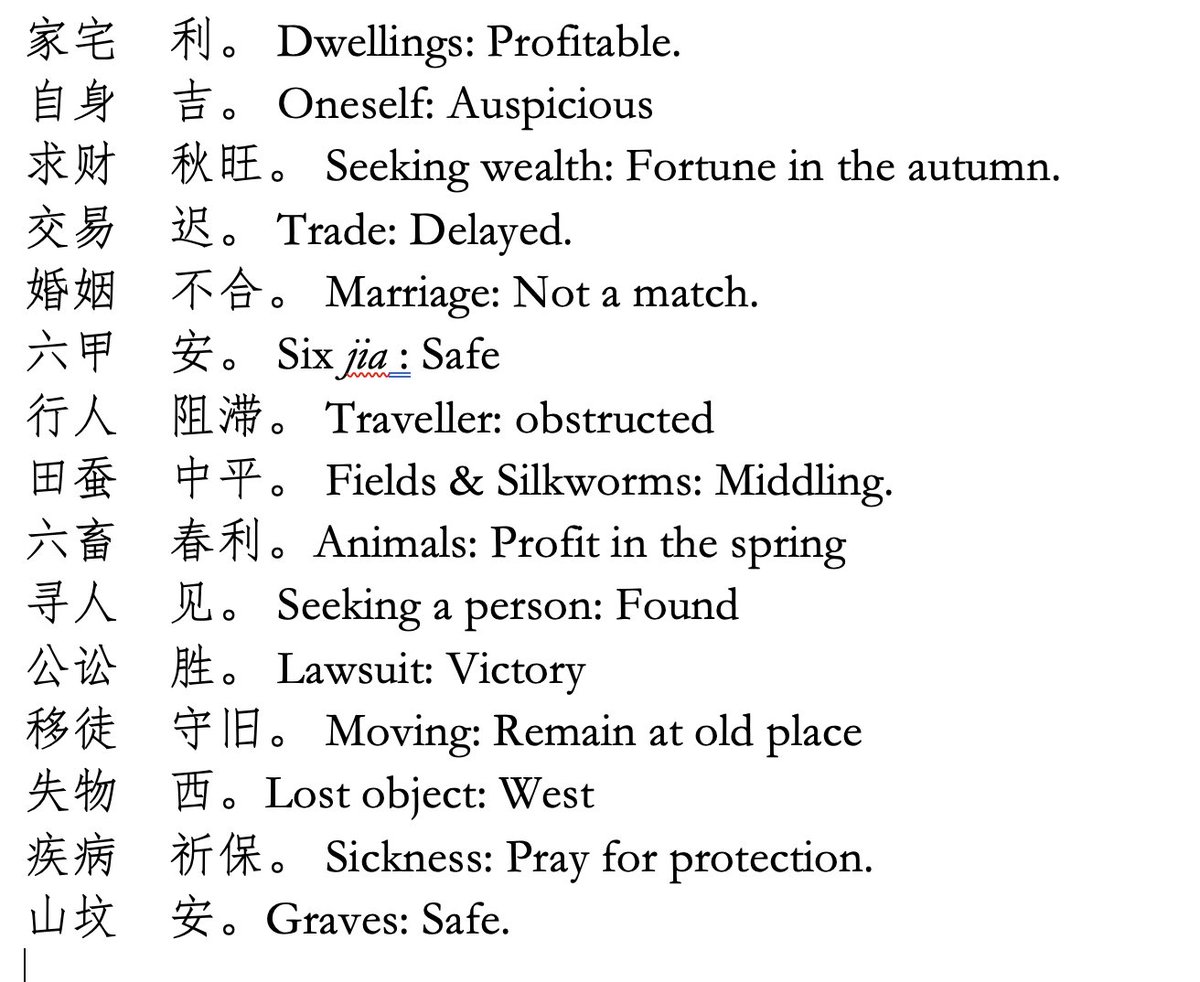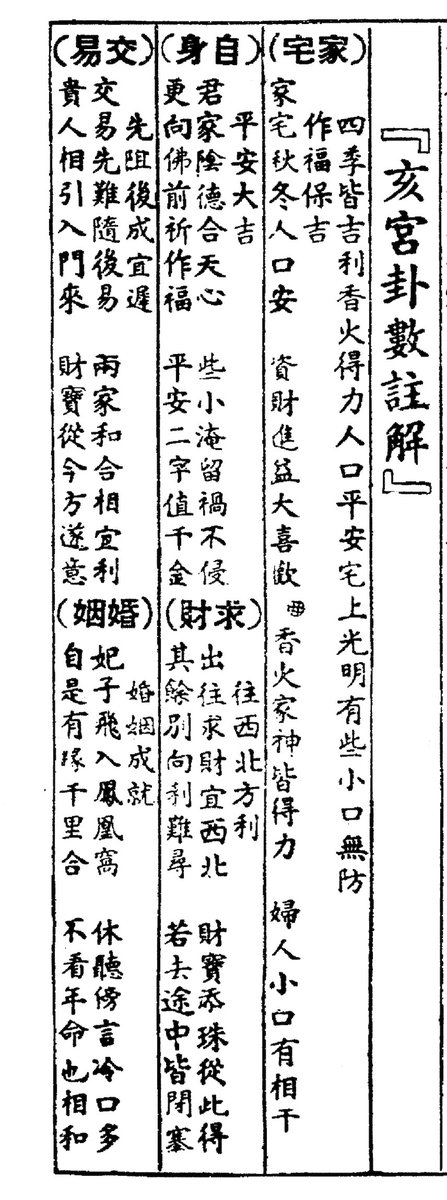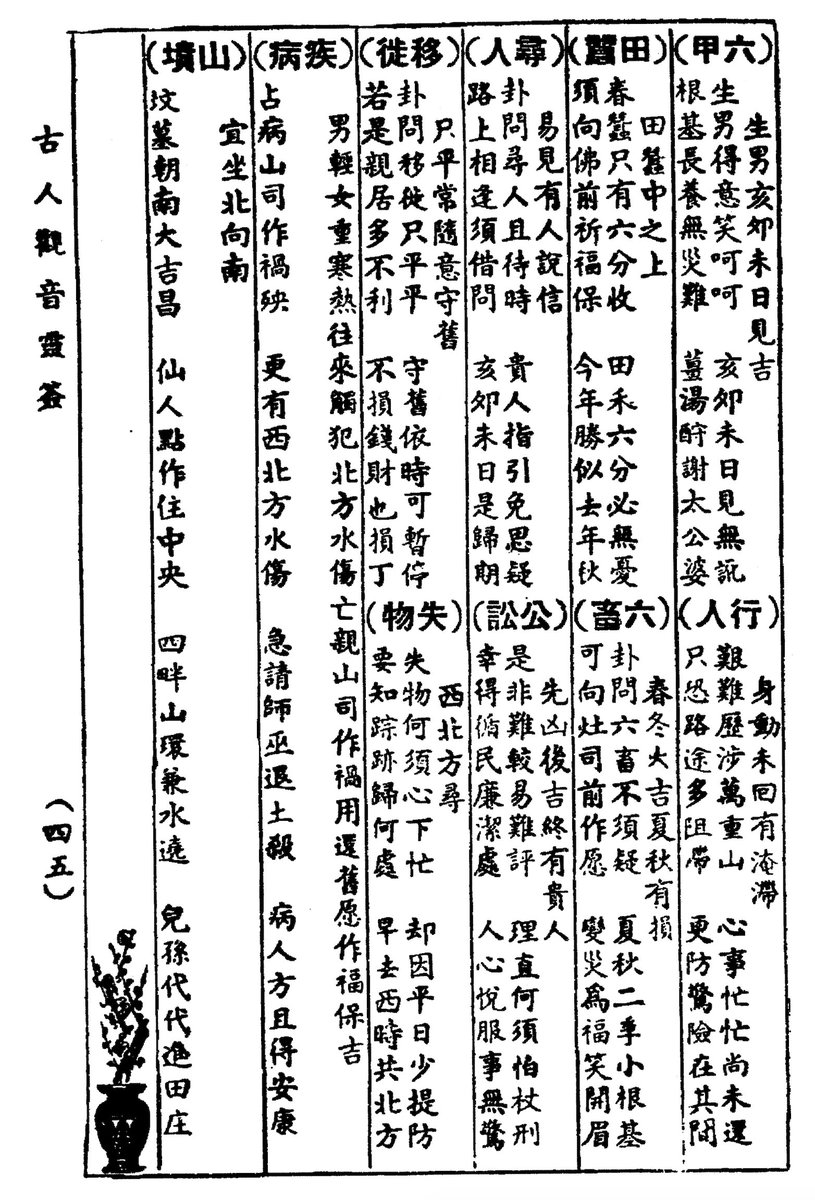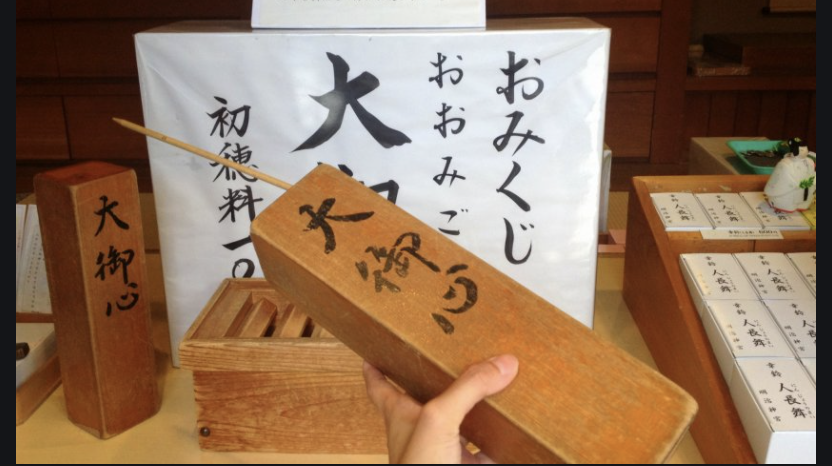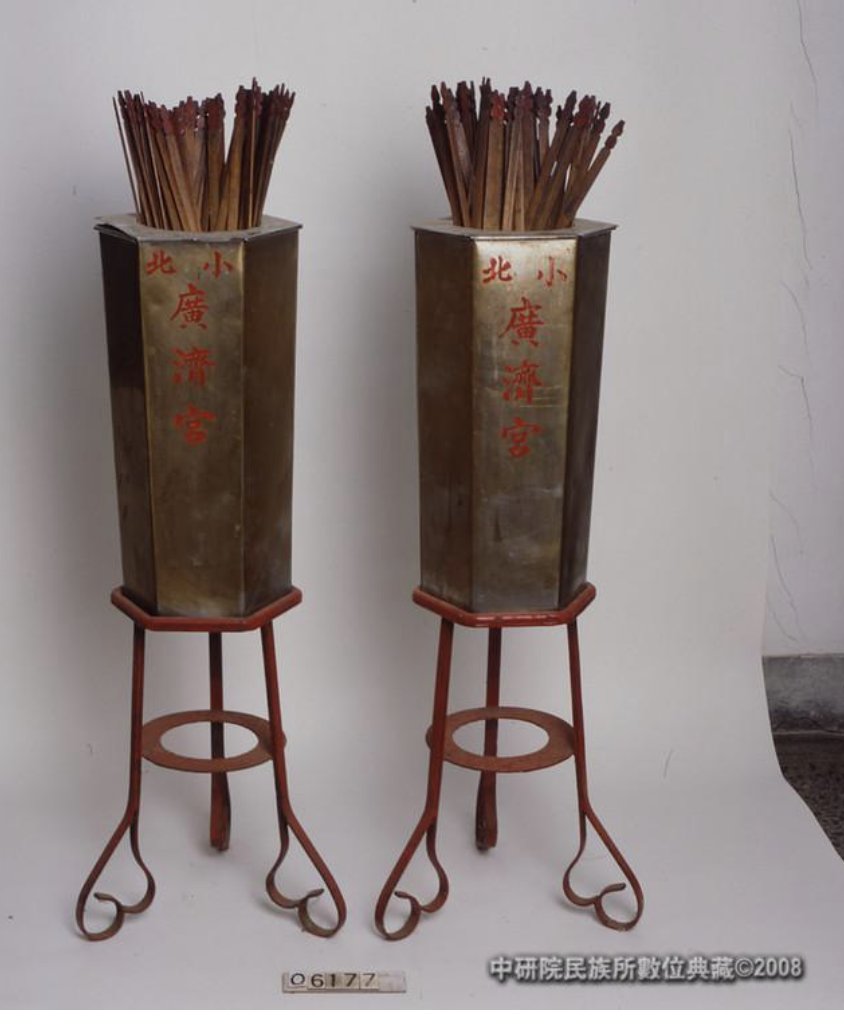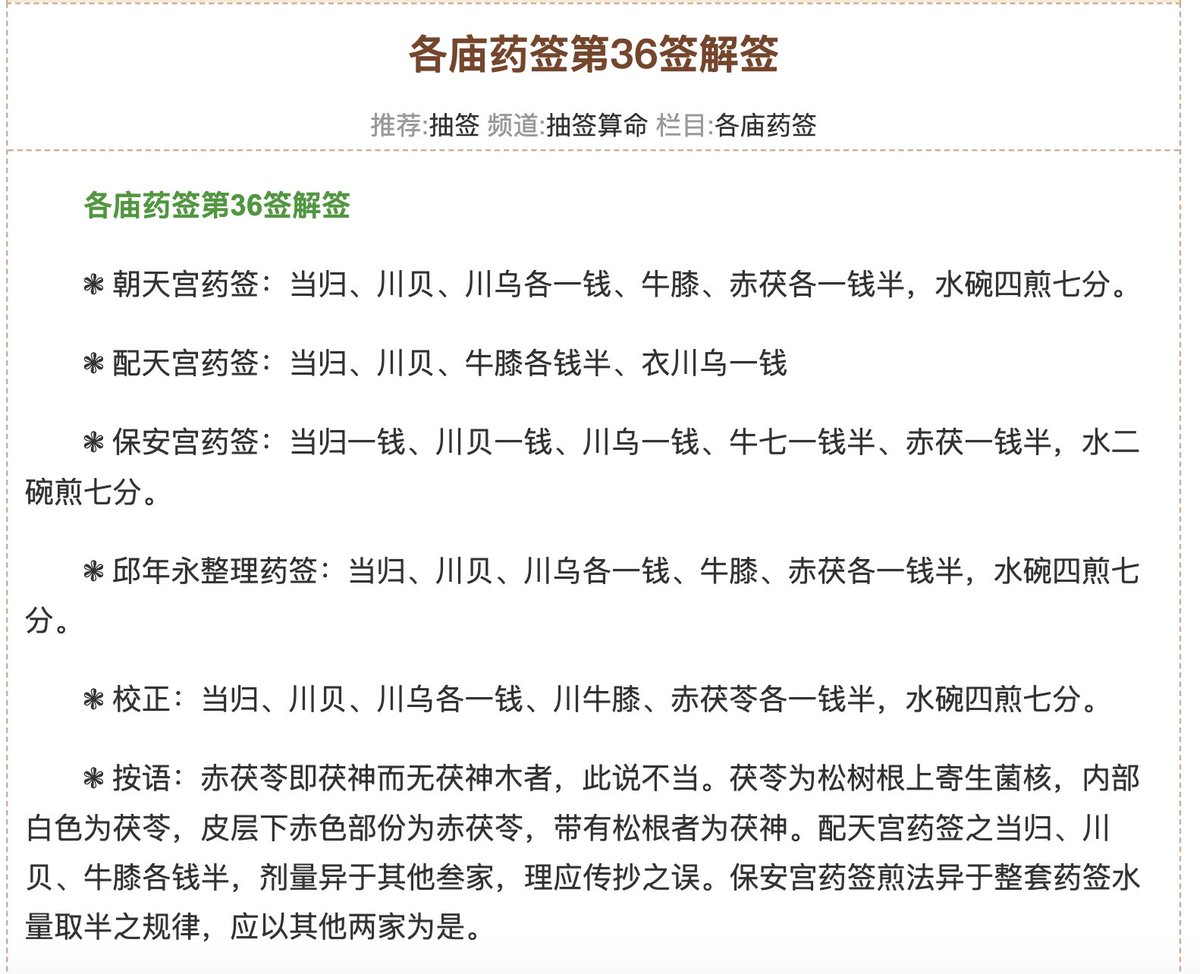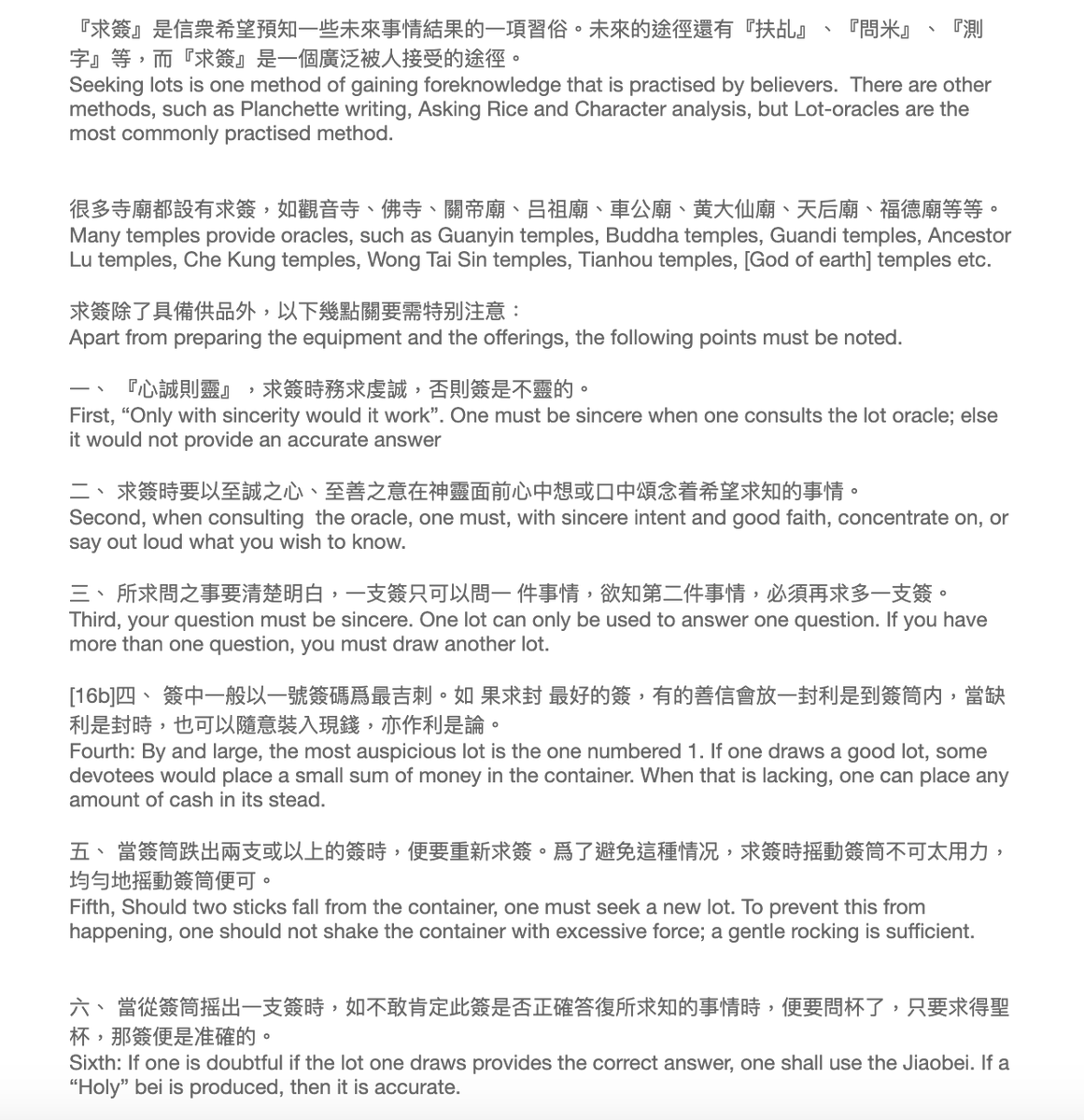http://1.In"> http://1.In this thread I will describe the “Guanyin’s Lots” one of the most common forms of divination in the Chinese-speaking world. his method of divination belongs to a family of ‘lot oracles’. 籤
2.There are several such oracles, each under the patronage of a particular diety: Lord Guan, Wong Tai Sin, and in this case, Guanyin. These oracles are typically consulted in temples, and follow the same prodecure.
3. Upon going to the temple, you make your petition to the deity, stating your question, &c. You then request from the attendant there the apparatus for consulting the oracle: A cylindrical container with 100 numbered slats of bamboo in it. https://item.jd.com/25207222130.html">https://item.jd.com/252072221...
http://4.You"> http://4.You consult the oracle by shaking this cylinder an angle a cylinder before the oracle’s patron deity, in this case Guanyin. At length, one slat will fall from the cylinder. This is the god’s answer to your question.
5/ You take this slat to the attendant, who would give you a slip of paper with the number corresponding to the slat that fell out. On this slip is printed the of the god’s response. (The text of these slips are also published as books, if the slips are inconvenient)
6. Here are some slips from the most famous Guanyin temple in Singapore. Its official name is "Kwan Im Thong Hood Cho Temple", but everyone there calls it the "Four-horse-road Guanyin temple" 四馬路觀音廟. the slips are bilingual; chinese on 1 side & english on the other
7 Anyway, A rather rough English translation of all 100 lots can be accessed here https://accesschinese.com/divination/guanyin/your-lot.php?tile=1">https://accesschinese.com/divinatio... ; a Chinese edition can be accessed here https://archive.org/details/baishiwenguanyin">https://archive.org/details/b...
8/ let us zoom in on one of the lots, no. 48.
The Chinese text has several components:
A: The number (in this case 48)
B: A four-line poem, which is the ‘substance’ of the lot: In this case:
鲲鸟秋来化作鹏
好游快乐喜飞腾
翱翔万里云霄去
余外诸禽总不能
The Chinese text has several components:
A: The number (in this case 48)
B: A four-line poem, which is the ‘substance’ of the lot: In this case:
鲲鸟秋来化作鹏
好游快乐喜飞腾
翱翔万里云霄去
余外诸禽总不能
9/ The English translation reads
https://accesschinese.com/divination/guanyin/your-lot.php?tile=48
“A">https://accesschinese.com/divinatio... partridge is changes into a Roc in autumn.
Such freedom is granted to no other bird.
Higher and higher it soars in the sky.
Miles of clouds he passes in his flight”
https://accesschinese.com/divination/guanyin/your-lot.php?tile=48
“A">https://accesschinese.com/divinatio... partridge is changes into a Roc in autumn.
Such freedom is granted to no other bird.
Higher and higher it soars in the sky.
Miles of clouds he passes in his flight”
10/
The temple& #39;s own translation is more proassic:
”A fledgling soon grows to be a mighty bird. It then flies to heights, other birds could not attain"
The temple& #39;s own translation is more proassic:
”A fledgling soon grows to be a mighty bird. It then flies to heights, other birds could not attain"
11/ a more literal translation would go:
“The Kun bird in the autumn turns to a Peng,*
It merrily wanders, frolics, and soars.
It soars for a myriad miles into the cloudy sky,
Of all other animals, none can do this!
*The Peng is a massive bird; hence the translation of “roc”
“The Kun bird in the autumn turns to a Peng,*
It merrily wanders, frolics, and soars.
It soars for a myriad miles into the cloudy sky,
Of all other animals, none can do this!
*The Peng is a massive bird; hence the translation of “roc”
12/ C: An explication 解, of the image given above: In this case
昆化为鹏。万禽不能。桂香一折。福禄自增。
The Kun turning to a peng!
This cannot be done by the Myriad beasts!
Plucking a branch of cassia,
Fortune and wealth increase by themselves.
昆化为鹏。万禽不能。桂香一折。福禄自增。
The Kun turning to a peng!
This cannot be done by the Myriad beasts!
Plucking a branch of cassia,
Fortune and wealth increase by themselves.
13/ Note that the oracle-slip given here has an error, the third line reads 卦音 “hanging sound” which does not make any sense; it is an obvious error for 桂香.Here is a sample of the correct reading from a book I possess
E: A general judgment on the lot—called a 卦, or [hexagram], in plain language: in this case,
此卦昆鹏興变之象,凡事有变動是也。
"This lot symbolises the Kun changing into a Peng. It signifies change in all matters."
此卦昆鹏興变之象,凡事有变動是也。
"This lot symbolises the Kun changing into a Peng. It signifies change in all matters."
Some texts have a section on the concrete meanings of this lot. Although it is not present in the present slip, it i found in the books (it is the 2 leftmost columns in img 1) well as the aforementioned English translation. I have provided my own translation
At this point, it is interesting to compare the rather rich set of meanings in the chinese text, as compared to the sparse interpretation of the lot in the English
The final ingredient is the “Palace” 宮 of the Lot (F) . Each of the 100 lots are assigned to one of the 12 Earthly branches. For more information on certain subjects, you’d see the palace of the lot, & look up the corresponding entry in a set of tables in the back of the book.
In this case, lot 48 is in the palace of the Pig. Going to the Palace of the Pig in the lot-oracle, we find more advice on 15 categories of things like family, seeking wealth, trade, marriage, illnesses, lost objects etc. Here& #39;s a scan of the relevant entry from my book.
eg: Lost objects
【失物】
失物何須心下忙?却因平日少堤防。
要知踪跡歸何處?早去西時共北方
In lost things why is there a need to be flustered?
This is surely because of carelessness in ordinary days
If you wish to know where did it go,
Head quickly towards the west, and north.
【失物】
失物何須心下忙?却因平日少堤防。
要知踪跡歸何處?早去西時共北方
In lost things why is there a need to be flustered?
This is surely because of carelessness in ordinary days
If you wish to know where did it go,
Head quickly towards the west, and north.
A final note: A version of this oracle- under the rather horrendous name of "Chi Chi sticks" arrived in the US in the early 1900s; As you can see from the cover, it bears the name of 關帝靈籤: The Numinous Lots of Lord Guan...
https://accesschinese.com/divination/kaucim/kaucim-pictures-01.php">https://accesschinese.com/divinatio...
https://accesschinese.com/divination/kaucim/kaucim-pictures-01.php">https://accesschinese.com/divinatio...
... another popular oracle in China. It would be an interesting exercise to see the text itself, to know if it actually was a translation of a Chinese oracle. In any case, I have been unable to find the text of the book online for now. if you can find it please let me know :)
As for english literature on lot-oracles in East Asia, the readers are directed to Strickmann& #39;s "Chinese Poetry and Prophecy: The Written Oracle in East Asia"
Regarding the method by which these lots are consulted, it is not amiss to mention 2 other methods. https://twitter.com/edwardW2/status/1311909126419562501">https://twitter.com/edwardW2/...
The Japanese equivalent. Omikuji are consulted using a cylinder that is sealed at both ends, but with a small hole in one end to allow one stick...
The Japanese equivalent. Omikuji are consulted using a cylinder that is sealed at both ends, but with a small hole in one end to allow one stick...
https://en.japantravel.com/tokyo/learning-about-omikuji/14796
...">https://en.japantravel.com/tokyo/lea... to fall out. This system prevents an occasional accident with the Chinese method: all the lots fall out of the cylinder at once in the process of shaking, ruining the question.
...">https://en.japantravel.com/tokyo/lea... to fall out. This system prevents an occasional accident with the Chinese method: all the lots fall out of the cylinder at once in the process of shaking, ruining the question.
the other mthd which i have seen in Chinese temples uses a larger cylinder, which is fixed on the ground, and longer slats- up to a meter long in some cases. in this method, the querent stirs the lots around in the fixed cylinder, and pulls out one slat.
https://digiarch.sinica.edu.tw/content/repository/resource_content.jsp?oid=4362360&queryString=%E7%AE%97%E5%91%BD%20%E7%B1%A4%E7%AD%92">https://digiarch.sinica.edu.tw/content/r...
https://digiarch.sinica.edu.tw/content/repository/resource_content.jsp?oid=4362360&queryString=%E7%AE%97%E5%91%BD%20%E7%B1%A4%E7%AD%92">https://digiarch.sinica.edu.tw/content/r...
The author has personally used a third method: A random number generator, usually http://random.org"> http://random.org : Set the website to generate a number between 1 and 100, and press the button
The Lot-oracles are a pretty diverse lot. For example, there are "Medicinal lots"藥籤 , of which one eg is here:
http://www.yuenei.com/chouqian/yaoqian/
These">https://www.yuenei.com/chouqian/... are specifically used in illnesses. The lots in this case are prescriptions, which are what the patron deity thinks will cure you
http://www.yuenei.com/chouqian/yaoqian/
These">https://www.yuenei.com/chouqian/... are specifically used in illnesses. The lots in this case are prescriptions, which are what the patron deity thinks will cure you
There are actually several versions of the medical lots. For example, lot no. 36 for Peitian temple is a prescription for the following:
当归、川贝、牛膝各钱半、衣川乌一钱
"Female ginseng, Fritillaria, Achyranthes bidentata each 0.15 taels; Aconitum carmichaelii 0.1 tael"
当归、川贝、牛膝各钱半、衣川乌一钱
"Female ginseng, Fritillaria, Achyranthes bidentata each 0.15 taels; Aconitum carmichaelii 0.1 tael"
http://www.yuenei.com/chouqian/yaoqian/36.html">https://www.yuenei.com/chouqian/...
I recall reading that in certain temples in Hong Kong (Wong Dai Sin& #39;s?) , there is actually an on-site pharmacy for the devotee to have his divine prescription filled in as soon as he recieves it. I recall further that there were special sets of lots...
I recall reading that in certain temples in Hong Kong (Wong Dai Sin& #39;s?) , there is actually an on-site pharmacy for the devotee to have his divine prescription filled in as soon as he recieves it. I recall further that there were special sets of lots...
... for treating eye ailments as well. In turn, I recall that there are also medicinal lots at the Kwan Im Thong Hood Cho Temple, but few people actually use them.
In any case, a rather substantive article [in chinese] on the subject can be seen here https://storystudio.tw/article/gushi/yaoqian-2/">https://storystudio.tw/article/g...
In any case, a rather substantive article [in chinese] on the subject can be seen here https://storystudio.tw/article/gushi/yaoqian-2/">https://storystudio.tw/article/g...
In any case, for further details as how to consult the lot oracle, you may consult this translation of a chinese ritual guide on my blog https://edwardwhite123.blogspot.com/2020/09/a-chinese-ritual-guide-from-hall-of_36.html">https://edwardwhite123.blogspot.com/2020/09/a...
Note especially point 6, which suggests using jiaobei- https://en.wikipedia.org/wiki/Jiaobei ">https://en.wikipedia.org/wiki/Jiao... a simple method of getting yes/no answers from gods to clarify if the god consents to the lot drawn. My relatives always seek confirmation with the jiaobei when operating the oracle.

 Read on Twitter
Read on Twitter
